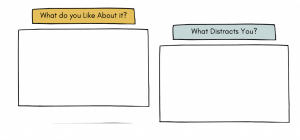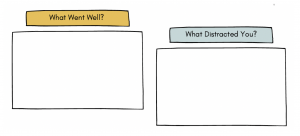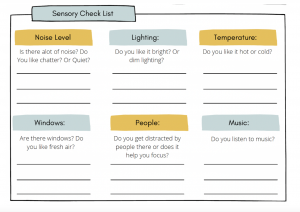How I Optimized My Work: A Physical Space Check-In
By Miranda, a Graduate Learning Coach
Part one on how I optimize work. Each of these will include check-ins and my own experience when I set the scene for productive work.
First, it must be said: We cannot control everything about our workspaces or mental space. We have roommates or partners who can distract us from our work. We might have limited space, if any. Evermore so, as students, our lives can be hectic and sometimes a real struggle. Computers can crash, the internet goes out, or there might be more significant issues we have to tackle in our private lives (food insecurities, homelessness, or other traumatic events). Secondly, these guides on how I have optimized my work environment are simply only that. Guides. They are a starting point to make them what you want or need to support your work. I only share this to say that I have found in my own life that nothing is a fix-all. Sometimes we need breaks and sometimes we need to give ourselves a little push. It is about knowing what we need as students.
______
Setting the Scene: Physical Space Check-In
Suppose you are like me, a busy graduate student (or really any type of student). In that case, you might get distracted by your own work environment. I would like to think after years of university schooling and being towards the end of my Ph.D., I would have figured out how not to get distracted. But alas, I have not. For example, I have balanced teaching my own courses, writing multiple research papers a term all while publishing, giving conference presentations, and completing my own research project. Yet, I never really took time to think about how I do all this or the way I work. After working at the Learning Center, I started to think about metacognition (or thinking about how you think and learn). Reflecting on how I work, I realized that oftentimes pressure is my main motivator. When deadlines fast approaching, I would suddenly become a superhuman graduate student who could finish it all (and…always have a stress inducted immune reaction where I would get sick the moment I turned in my last paper).
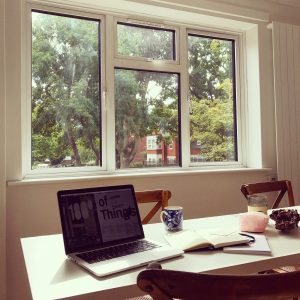
The funny thing is, upon reflecting, I was never taught or given guidance on the best ways to optimize my work. No one ever sat me down in class and suggested that there are skills to knowing how we learn. So I reacted to what needed to be done instead of setting myself up for optimizing my work. This got me thinking about distractions and how they impact my dissertation work (and I can tell you, on what feels like the millionth round of editing a dissertation chapter, it is easy to get distracted by pretty much anything).
I will sit down to edit my introduction and instantly realize how hungry I am. After getting up to get a snack, I will settle back in, edit one sentence and realize that I am now thirsty. As I get a glass of water (or seltzer if I feel fancy), I see the dishes piled up in the sink. So, of course, I must clean the dishes before sitting back down to do my actual work. After an hour or so, I realized I had gotten nothing done on my introduction.
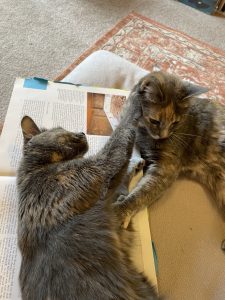
I realized that often my work environment distracts me from my work (and to be honest, I let it). Hence, I decided recently that I needed to check in to figure out what distracts me and helps me focus and be productive! My thinking was if I could counter my distractions, maybe I would support myself in working. So I did some good old self-reflection: what is my process when I sit down and work?
First off, I am rarely able to sit down and immediately start working. Frequently, it takes me a while to transition into working on my readings, writing, or edits that I need to complete. If I am bored or unmotivated to work, I will use what is around me to avoid doing my work. This has been especially true for me when I am trying to edit my dissertation chapters (or, even worst, formatting the document). I will sit down and instantaneously stare at my screen blankly or pick up my phone and scroll through social media. I also have the incredible talent for sitting down to work and then realizing that I should clean my apartment instead (and at least it gives instead gratification of seeing how clean it is).
With the pressure of deadlines for a final draft of my dissertation coming up fast, I wanted to create a new system for myself that optimizes my workspace. I thought that maybe if I set three various check-ins to optimize my transition to my work and my space, I could stay focused during work.
Sensory Environment Inventory
Why does our environment matter for staying focused? I have found that I am easily distracted when I do not find the right setting for my work. For example, if where I am working is too loud or cluttered, I have difficulty concentrating. Likewise, I will not work effectively if it is too dark or people talk around me (coffee shops for editing are my worst nightmare). To figure out the best setting for my work, I reflected on when I had been productive and what environment I was in.
I asked myself, what were my surroundings like when I was really productive last week?
To answer this, I made a list of where I most frequently worked (i.e. desk in my apartment, carrel at the library, coffee shop, outside workspace, couch/sofa chair). For me, it is at home at my desk or outside at my patio table. I then wrote out what about the space I liked?
- What helped me work in that environment?
- How was the light in my apartment?
- How is the airflow?
- Do I like it hot or cold?
- Is there a specific smell that helps me relax?
- How loud is my ideal space (coffee shop chatter, music, or silence)?
I found I love a bright space with the window open for fresh air. I really like it cozy but not too hot. Clearly, I want to set an ambiance for my work that includes candles. I have started to not listen to any music for the first hour of editing.
After thinking through the sensory environment, I began to think about my workspace itself. How is my space organized? How comfortable or efficient is it?
- Is my chair or seat conformable (pillows or a blanket)?
- Is my desk or work area clean (clutter)?
- Do I have the supplies I need to do the goal or task I am aiming to complete (books, paper, etc.)?
- What might distract me in my environment that I could remedy?
- Should I remove my cell phone?
I love a blanket or sweater when I work. But, I need to be at a desk (I will fall asleep on a couch). I have a laptop stand with a keyboard to sit up straight and not hurt my back. Most importantly, I need to de-cluttered space. Finally, I think through what my needs will be while working in my chosen space.
- By this, I mean, do I usually get up to get water?
- Do I like having a snack while I work?
- What can I pre-set to help me stay focused? What will my needs be?
I always need water when I work, so I pre-set it out.
My Reflections
The first time I worked through my sensory environment inventory, I reflected on when, where, and why I was productive in certain places. For example, I know I was not effective when I went to the coffee shop and that it was a disaster when I tried to work on the coach. Now, I know that there are specific spaces I work better in, and I can use this to optimize my work time.
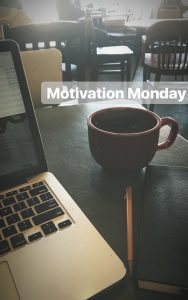
What I have learned about myself through reflecting and taking an inventory of my process is that I need certain conditions to focus. Ideally, I have a quiet apartment all to myself on a sunny day with the window open so that I can hear the breeze outside. I will listen to folk music as I set up my computer station, light a candle, and gather water and supplies for my editing time. I now know I must place my phone upside down on silent mode at the edge of my desk and have a sweater or blanket nearby to wrap myself in. Once seated, I check in with my goals and how I am doing. Take several deep breaths and begin to work.
For myself, I cannot control the weather, but there are some pre-set actions I can do to help support my work. What these often depend on what type of work I am doing. As I finish my Ph.D., I am currently editing my entire dissertation (trust me, it is a rather daunting task). I have learned I need a tranquil space to edit, as it is one of the most complex parts of the writing process. However, if I am reading, I can curl up on my couch or find a sunny spot outside campus. I guess it is about learning how I focus and leaning into that instead of fighting against it.
My Process
For me, I follow the following themes to pre-set my workspace beforehand:
- Planning: I plan out my week every Monday, so I know my weekly and daily goals. This helps me know when, where, and what I need to do during my work time.
- Having A Space: Whether you like working in the library or at home, having a space with organized items is a huge help. I know I work at home and my graduate office well, so I made sure that I had the supplies I needed at each place. For me, I like having a private area with a bathroom, window, and water nearby. Knowing those are my two spots takes off a lot of decision fatigue when knowing I have to work but not having a place to sit down.
- Preparing My Space: I know I love a clean and de-cluttered workspace. So, I plan 15 minutes in my work time to tidy up and transition into work. I also know that if I get chores and errands done on Sunday, the apartment is cleaner during the week and more accessible for me to focus. I also always use this one candle (a light cedar scent), so I associate it with my editing at this point.
- Trying It Out: I honestly did not know the best way I focused until I tried out a few different options and reflected on them. For example, I thought I needed music to work, but a few weeks ago, I decided not to play music to see if it helped my focus – which it did. Trying out different spaces and mindful check-ins and seeing which works the best is super helpful (not one size fits all). The biggest thing I have learned is that reflecting and thinking through what has worked and what has not can guide all of us to find the optimal work environment for ourselves.
My next steps are to think about my Mental Space before working! Tune in more for an inventory on mindfully transitioning into a focused work mode.
This blog showcases the perspectives of UNC Chapel Hill community members learning and writing online. If you want to talk to a Writing and Learning Center coach about implementing strategies described in the blog, make an appointment with a writing coach, a peer tutor, or an academic coach today. Have an idea for a blog post about how you are learning and writing remotely? Contact us here.



